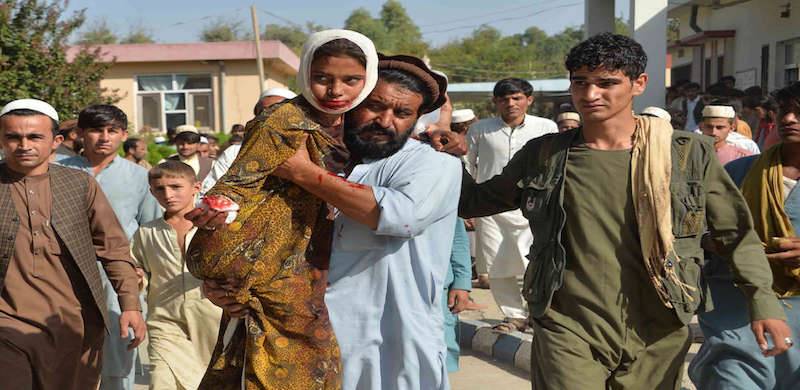
There is a dreadful prediction in the western security experts forecast about what international terror groups like Al-Qaida, Al-Qaeda in Indian Subcontinent (AQIS) and ISIS could do in the neighbouring countries of Afghanistan as the post-withdrawal Afghanistan is likely to plunge into a military chaos or anarchy in the coming days, weeks and months—In what western intelligence officials, reportedly, are describing as spoiler’s violence the neighboring countries of Afghanistan could use the remnants of international terror groups still hiding in different parts of Afghanistan to settle their scores with their rival countries.
In this regard, western intelligence is specifically mentioning the names of Pakistan, India and Afghanistan as countries whose security apparatus or intelligence agencies could settle old scores by using remnants of terror groups to carry out violence in the neighboring countries of Afghanistan.
American officials and leaders have variously described Al-Qaida in Afghanistan as a shadow of its former shelf or very weak to carry out terror attacks in mainland America. ISIS saw its peak in Afghanistan in the period between 2014 and 2016 when there was a sudden rise in its profile and groups and bands from Afghan Taliban defecting to their mother organisation to join ISIS. ISIS in Afghanistan in recent days has also seen a declining profile as the groups and bands of former Taliban defect ISIS to rejoin their mother organisation.
According to several reports based on Western intelligence analysis of the situation, the “Key members of Al-Qaeda’s central leadership continue to see Afghanistan as a strategically important base, despite the availability of more permissive potential bases and the considerable threat of U.S. counterterrorism activity. This is most obvious in the case of al-Qaeda chief Al-Zawahiri”.
“According to the United States Central Command (CENTCOM) Chief Gen. Kenneth F. McKenzie, the U.S. military assesses that Al-Zawahiri is in Afghanistan.27 Al-Qaeda’s once heir apparent Hamza bin Laden, the son of the movement founder Osama bin Laden, also appears to have remained in Afghanistan before being killed in the Afghanistan-Pakistan border region.
While much of Al-Qaeda’s central leadership appears to be outside Afghanistan, perhaps in Iran or Syria’s Idlib Province, some al-Qaeda central leaders remain in Afghanistan.
The story of ISIS in Afghanistan is also centered around a persistent decline, “After a dramatic rise in Afghanistan from 2014 to 2016 with membership running into the thousands, it has been in steady decline. Over the last two years, the group has suffered back-to-back losses against U.S. and Afghan military operations in the eastern provinces of Kunar and Nangarhar. These losses have been compounded by the Afghan Taliban’s separate military campaign against the Islamic State.
The Islamic State is reported to command around 2,200 fighters, but its overall trajectory is marred by defections of leaders and rank-and-file, loss of territory, and fragmentation of battlefield allies” A report based on western intelligence experts reads.
The spoiler’s violence could take the form of terror attacks inside Pakistani territory and if Western intelligence experts are to be believed Indian intelligence could be instrumental in using remnants of terror groups against Pakistan. This doesn’t seem far-fetched when seen in the light of Pakistani allegations that India intelligence has penetrated Tehreek-e-Taliban Pakistan (TTP) and was instrumental in pushing the militant group to carry out terror attacks inside heartland Pakistan. There are countless reports indicating the webs that link TTP with international terror groups like Al-Qaeda and ISIS.
Similarly, this spoiler’s violence could take the form of Pakistan using terror groups to carry out terror attacks against Indian interests in Afghanistan. Nothing seems far-fetched if the recent past is any guide—Indians using military and intelligence assets in Afghanistan against Pakistan is a well known and well documented reality.
Similarly, the bitter memories of the US administration holding Pakistani intelligence responsible for the terror attack on Indian Embassy in Kabul are still fresh in national as well as international memory.
This is another aspect of Afghan conflict which festers like a bleeding wound—Pakistani and Indian security apparatuses don’t have a settled “Rules of the game” to protect their interests in Afghanistan. Pakistanis are nervous Washington wants to give India a disproportionate role in post-withdrawal Afghanistan. Indians are nervous that their bitter enemies in the shape of Taliban could disrupt their economic interests in Afghanistan. Spoiler’s violence is not at all a far-fetched threat in this scenario.
Spoiler’s violence has antecedents in Afghan land—look at how US administration accused Russia and Iran of supporting Afghan Taliban to carry out violence against American troops in Afghanistan. Russian indirectly accused Americans of bringing and settling ISIS fighters in Northern Afghanistan close to the borders of Central Asian states, which Russia considers within its security parameters.
The remnants of Al-Qaeda and ISIS in Afghanistan are hosting terror groups which originated in Central Asian societies and which have been engaged in military conflict with the Central Asian government.
Chinese are no less concerned about the developments in Afghanistan: They know that the Chinese separatist elements are in alliance with ISIS, Taliban and Al-Qaida. Some of these Chinese separatist elements are in alliance with Pakistani Taliban and were being hosted by the latter until recently. So the fears of spoiler’s violence reaching Chinese territory are real.
A centralised Afghan state is absolutely necessary to control this threat. The international community must ensure that the regional countries don’t play dirty and don’t try to push forward their own proxies in Afghan power struggle.
